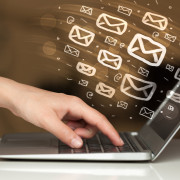Email replies: How to avoid emotional emails
Professional email communication is essential in business situations. However, people sometimes let their emotions get the best of them and send an email they later regret. Multiple punctuation marks, all-capital letters along with a rude and unprofessional tone are often used to show how upset the sender is. We have all received them at one time or another. You may have been guilty of sending one, as well.
A quick reaction to receiving such an email would be to immediately send a response even angrier than the original, but what would that solve? Answering with your own angry and emotional email would only lead to more problems later. The important thing to remember when receiving such an email is to remain calm. There is no reason to maintain the angry dialogue by responding in the same manner, but simply ignoring the email won’t make the issue go away either.

3 Tips on what to do to avoid emotional replies
Don’t write your response immediately. If you do, some of your own lingering emotions may show in your writing. Put the email aside until later in the day.
1. After some time:
- Take a deep breath
- Try to see the situation from the sender’s position
2. Ask yourself:
- Why are they upset?
- Is the issue a legitimate complaint, or has the sender lost sight of the big picture?
- How can I help solve the issue?
3. When writing your response:
- Stay professional, diplomatic and objective
- Stick to the facts
- Do not respond to any of the original email’s unprofessional language or personal attacks
Emotional emails are often written to get a reaction and to bring awareness to a particular issue. Make sure you acknowledge this issue, but don’t try to pass the blame on to somebody else. By remaining professional, the sender will often realize how unnecessary their tone and language was.
Helpful phrases to help avoid emotional emails
Intro sentences:
- “Thank you very much for taking the time to write me today.”
- “I hope my email finds you well.”
- “I have just read your email concerning…”
Addressing the issue:
- “I understand your concern about…”
- “With reference to your inquiry about…”
- “Thank you for bringing … to my attention.”
Closing sentences:
- “I appreciate your continued professionalism and patience as we resolve this issue.”
- “Working together, I believe we can find a reasonable solution to this issue.”
- “Your email has helped bring attention to this important issue.”
By keeping your email clear, concise and diplomatic, you open the door to a more efficient dialogue while also strengthening your professional relationships. Always avoid using language that you wouldn’t use if speaking to somebody face-to-face. If you have any phrases you like to use in these situations, please let us know below. Also, check out our seminar on reader-oriented writing in English to improve your overall email communication.







Kommentare sind deaktiviert.